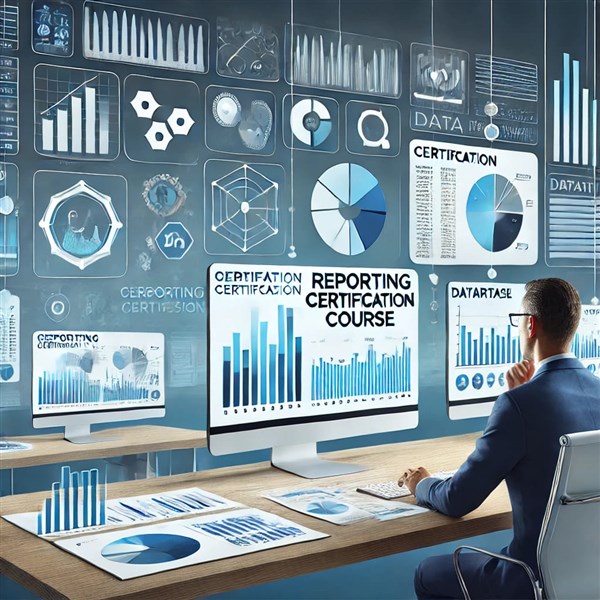Unable to find what you're searching for?
We're here to help you find it
In today’s data-centric business world, the ability to gather, analyze, and present data effectively is more critical than ever. Organizations rely on timely and accurate reports to make informed decisions, identify opportunities, and mitigate risks. As a result, professionals skilled in data reporting and visualization are in high demand — and one of the best ways to prove your expertise in this area is through a reporting certification course.
Whether you're a business analyst, data professional, finance expert, or IT specialist, earning a reporting certification demonstrates that you possess the tools, techniques, and know-how to translate raw data into actionable insights. But what exactly do you gain when you complete such a course?
In this blog, we’ll explore the top skills you’ll gain from a reporting certification course, and why they are so essential to succeeding in today’s analytics-driven workplace.
A key component of any reporting certification is learning how to present data visually. This includes:
Popular tools like Power BI, Tableau, Qlik, and Google Data Studio form the backbone of many certification programs. These platforms help you convert rows of raw data into engaging visuals that tell a story at a glance.
Mastering these tools enables you to create dashboards that executives and stakeholders can use for real-time decision-making, enhancing both your value and visibility within your organization.
In addition to dashboards, you’ll learn how to build static and dynamic reports tailored to your organization’s needs. This includes:
Whether you’re working in Sales, Finance, Operations, or HR, being able to generate and customize reports is a key deliverable for any data professional. Reporting certification ensures that your reports are not only accurate but also audience-specific and easily digestible.
Reporting certification courses typically focus on industry-standard tools. Depending on your chosen course, you may become proficient in:
By gaining hands-on experience in one or more of these platforms, you significantly expand your toolset and become adaptable across different industries and use cases.
Before you can build reports or dashboards, you need clean, organized data — and that’s exactly what reporting training will teach you. Expect to learn:
This skill is often overlooked but is crucial to report accuracy. Messy data leads to misleading reports, which can result in poor business decisions. Certification ensures you understand how to clean and structure data effectively for reporting purposes.
A strong reporting certification course goes beyond basic charts and teaches you how to derive insights using calculations and logic. You'll learn how to:
These skills allow you to go beyond surface-level reporting, offering meaningful metrics that drive strategic decisions.
Data without context is just numbers. Certification courses teach you how to communicate insights clearly and effectively, helping you build a compelling narrative around your visuals.
You'll learn techniques for:
This is a critical soft skill — and one that differentiates great analysts from average ones. Being able to “speak data” in a way that business users understand is highly valued across all industries.
In real-world scenarios, not all reports should be visible to all users. In a reporting certification course, you’ll learn how to:
These skills are essential for working in enterprise or regulated environments, where data privacy and user access control are paramount.
You’ll also learn how to connect your reporting tools with various systems, including:
This integration knowledge is vital for building a comprehensive reporting ecosystem that brings together data from across your organization.
Modern reporting tools can deliver real-time insights or scheduled snapshots. You’ll learn to:
This makes you a valuable asset in time-sensitive roles, where up-to-date data is critical for success.
Finally, reporting certification teaches you how to share your work effectively across teams, including:
These collaboration skills are key in today’s remote and hybrid work environments, where seamless communication is essential.
Conclusion
A reporting certification course equips you with an impressive arsenal of technical and analytical skills that are highly sought after in today’s job market. Whether you're building your first dashboard or preparing enterprise-grade reports, the skills you gain — from data visualization to security management — are practical, relevant, and directly applicable in virtually any industry.
Whether your goal is to advance in your current role, pivot into business intelligence, or land your dream job in data analytics, a certification in reporting can serve as the launchpad for your success.
Koenig Solutions is a leading IT training company that offers a wide range of certification courses in top technology areas. With their expert instructors and innovative training methods, Koenig ensures learners acquire the skills they need to excel in their careers. Their Reporting Certification Course is designed to provide learners with a deep understanding of data reporting, preparing them for a successful career in this field.
In conclusion, a Reporting Certification Course is an excellent investment for anyone looking to enhance their data reporting skills. With the comprehensive training from Koenig Solutions, you can be assured of gaining the skills you need to excel in this field.

Aarav Goel has top education industry knowledge with 4 years of experience. Being a passionate blogger also does blogging on the technology niche.










